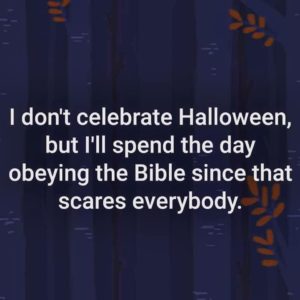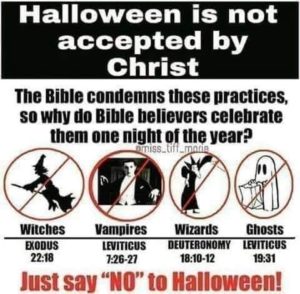When I was little, we went trick-or-treating. I remember doing that for a few years, way back in the day. Then everything changed.
At some point, my parents became wise to the fact that Halloween is a pagan holiday, All Hallows Eve, dedicated to glorify Satan and demonic forces.
Yeah, we were pretty ignorant, blissfully unaware that paganism and Satanism are distinct. We were blissfully unaware that Halloween was actually, just like Christmas and Easter, another attempt by the Christian church to appropriate a pagan holiday, this time the holiday of Samhain. We were also blissfully unaware that Satanists don’t actually sacrifice children.
That was decades ago. But even today, the ignorance continues, sometimes intensified, perpetuated by Evangelical nutjobs on Fox News. And it shows up in my Facebook feed. Mostly, Facebook doesn’t show me Evangelical bullshit, probably because (a) it knows I’ve heard it all before and I’m just sick and tired of it, and because (b) the few Evangelicals who are still Facebook friends rarely post it. But Halloween is one of the few days of the year that the religious paranoia awakens from the grave to haunt us.

Here’s an interesting example.
Precisely which parts of the Bible do you think it would scare people for you to follow?
I mean, there are plenty of parts of the Bible that I think many people are horrified to see others follow. There’s that whole genocide thing in the Old Testament. And then there’s the thing about stoning gay people (which some Evangelicals advocate for even today). And the thing about legitimizing slavery, found in both the Old and New Testaments, which was a great comfort to anti-abolitionists in the US, because it provided a Biblical moral argument for oppressing Black people. And despite all the Bible’s talk of being kind to foreigners and treating them like widows and children, there’s also a hell of a lot of tribalism mixed in as well, which is a comfort to modern Evangelical xenophobes.
And then there’s that religious nationalism, which was the norm in times past. The Bible, and particularly the Old Testament, was written in a time when power was invested in the king, and God’s blessing validated that power. Today, power is democratized, with checks and balances, divided between branches of government and spread out over many individuals. And what gives power legitimacy is not the blessing of a god, but the blessing of the people. Our modern humanist government has replaced the Bible’s outmoded religious norm.
So yeah, there’s an awful lot to dislike in the Bible. But truthfully, most Bible-believers don’t follow (most of) the creepy parts. Unless you are a fundamentalist, bent on excluding and punishing anyone who challenges your dogma, no one really cares what supernatural stories you believe in or how you worship. Hell, you could believe that you are a wizard from Hogwarts, for all I care; and though I would question your sanity, I would never feel threatened by you.
This meme is interesting because it’s a fundamentalist trope, which I remember repeated in many forms. We are the chosen ones, so the world will reject us, because they’re afraid of the truth. It’s a victim narrative.
We never considered the possibility that we in fact were afraid of the truth, that our religion had made us callous in order to prevent us from discovering that fact, lest we see with our eyes, hear with our ears, understand with our hearts, and be saved. (See Matthew 13:15.) We never considered that our attempt to blame the world of fear was actually an emotional defense mechanism, a way to project our fears into them.
Not only does fundamentalism oppress, but it uses that oppression to validate all-too-common victim narratives such as this one.

Here’s another meme, which is either serious or satirical. I’m pretty sure it’s the former, but I honestly can’t tell anymore.
I definitely grew up being indoctrinated with this paranoia. When I was young, we stopped celebrating Halloween for exactly these reasons.
One of the most fulfilling aspects of leaving that world has been the opportunity to meet people who practice spirituality different than what I grew up with. People who are Wiccan, and witches, and Satanists, and atheists. And sometimes none of or some combination of the above. Or something completely different.
And it’s all good.
And it all makes our world a more interesting and richer place.